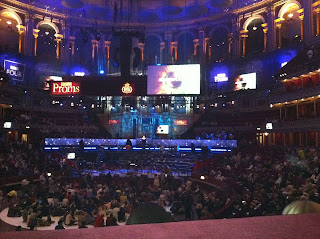A pleasant afternoon and we took the train up to town, the tube to South Ken. We strolled over to Carluccio's for an early dinner before walking up to the Royal Albert Hall to attend Prom 11. Tonight the Prom was based around the BBC series 'Human Planet' and the music composed for this series by Nitin Sawhney. We would also be entertained by some of the music featured in Radio Three's parallel series, 'Music Planet'. Special screens had been installed all around the Albert Hall so we could watch some of the film sequences while the music was being played.
The orchestra was the BBC Concert Orchestra conducted by Charles Hazlewood, who managed to appear on the platform without anyone noticing, and he began the introduction almost before the audience had time to applaud. After the first piece, Paul Rose introduced himself as our presenter for the evening. The first performer of the evening from ' Music Planet' was Rasmus Lyberth from Greenland who came on dressed in a grey suit with a straw hat along with a fiddle player and an accordionist. He performed two songs about Greenland straight from the heart, which the audience loved, then Paul Rose came back to set the scene for the next piece of Nitin Sawhney's soundtrack. This was the format for this first half, alternating ethnic music with the orchestra, with Paul Rose setting the scene. The groups we were treated to were from Zambia and Mongolia, with Enock Mbongwe performing with a kalumba, a traditional Zambian gourd instrument coming on next. He wore traditional dress with a patterned shirt that had a special hole cut out so that the gourd could resonate against his tummy. He introduced himself and told us that this was his first time outside Zambia. His performance was so full of exuberance. The last performers before the interval were from Mongolia, the group called Khusugtun. They are six musicians who play morin khuur, the horse head fiddle; ikh khuuur, the horse head cello; yatga, the Mongolian zither; guitar; dombor, a Kazakh folk instrument; limbe, a Mongolian flute; djembe (African drum played with bare hands). They also sing, using the Mongolian throat singing technique. They were wonderful, and the audience really enjoyed their music and all the music of the first half of the concert.
Before the interval, Charles Hazlewood had announced an extra piece to begin the second half of the concert - the 1812 Overture performed on instruments made from scrap. This will apparently be a feature program on BBC Four later in the year. The instrument makers were all in one of the boxes to hear the performance, which was OK considering the difficulties of playing and keeping these instruments in tune. But, it was a bit strange putting this piece in the middle of this special Human Planet concert.
So once this was done, we got back to Nitin Sawhney's music on real instruments, and also two more ethnic performances. The first was from the group of three women from Sakha region, Siberia, Ayarkhaan. Their costumes were truly fabulous, ethnic cloth with gold lame and fur sleeves, gold headdresses and horsehair switches in their hands. They played mouth harps and made extraordinary noises with their mouths as they performed, first, the Horse song, and then the tribute to the patron of the blacksmiths, Kudai Bakhsy. The audience loved them. The final ethnic performers were the shark-calling group from Papua New Guinea's New Ireland, Bibilang. The eight performers entered, dressed in yellow traditional costumes with amazing straw headdresses. Their instruments seemed fairly recognisable as guitars but also included various ethnic percussion instruments. Paul Rose introduced them, and as they were named, they each waved to the audience who cheered them. Then they performed a series of songs, to the last of which two of the band danced the shark dance. Everyone really enjoyed the performance and the band didn't want to leave the stage, but were finally led off.
Nitin Sawhney now came on to address the audience about how he went about putting the music for the series together over an eight week period of hard work. He tried to capture all the different moods from desert to arctic conditions, rainforest to steppes; people living on the edge. He then re-orchestrated the score to put together performance pieces (and he could make a symphony from it, one would think). At last it was time for the finale, another wonderful piece of Nitin Sawhney's music, after which all the groups came back on stage for a final bow. The audience applauded, then gave them a standing ovation, well deserved for a wonderful evening of music from all over this planet.

No comments:
Post a Comment